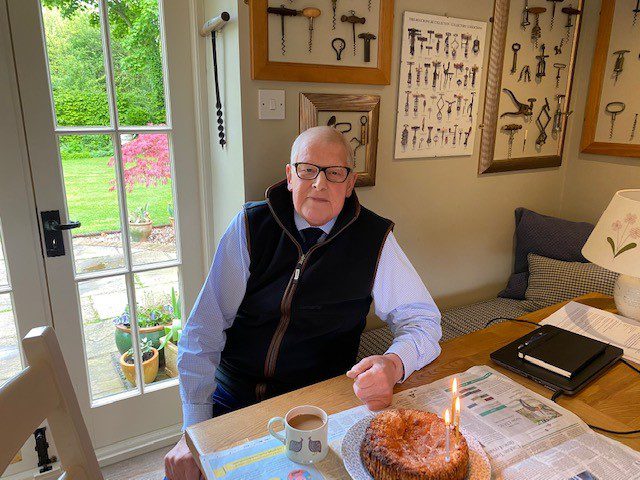- Patients
- Patient resources
- Patient stories
- Pauls story patient stories at GenesisCare

Paul’s Story – 177Lutetium PSMA therapy for advanced prostate cancer
Article
Paul from West Cambridge is a retired businessman, who at 78, is married with three children and nine grandchildren. He was first diagnosed with prostate cancer in 2005 and has had treatment with chemotherapy, radiotherapy and in the last 10 years, hormone therapy.
Throughout his treatment, he had frequent PSA tests to help monitor his progress. Two years ago, his PSA levels began to increase, an indication that his disease was becoming resistant to the hormone treatment. It was during this time that his wife was having cancer treatment at GenesisCare in Cambridge and Paul raised the topic of his own health with his wife’s treating clinician. An innovative new treatment, 177Lutetium PSMA therapy, a treatment for men with advanced prostate cancer was mentioned and having read through the documentation provided, Paul asked to be referred to Dr Yong Du, Consultant Physician in Nuclear Medicine & PET/CT at GenesisCare.
Paul said, “Having discovered the hormone treatment was no longer effectively treating my cancer, I was pleased to have another option available to me.”
Paul had a 68Gallium PSMA PET/CT scan to confirm whether he could benefit from 177Lutetium PSMA therapy. The scan confirmed he was suitable, and he was able to start his treatment two weeks later.
The treatment itself is a very simple process involving an injection of 177Lutetium PSMA into a vein in your arm. It’s usually given every six to eight weeks, typically over six cycles as an outpatient in our purpose-built Theranostics suite in Windsor. Paul had eight sessions over 15 months. The treatment was pain free with just a few very mild side effects.
Of his treatment, Paul said, “Compared to the other treatments, I’ve found 177Lutetium PSMA therapy easy to tolerate. It feels like a kinder therapy. I haven’t experienced any side effects other than mild fatigue and a dry mouth, which only lasted for a couple of days each time”. He continues “It’s allowed me to maintain my quality of life and continue with my normal day to day living.”
Commenting on Paul’s case, Dr Yong Du said “Paul had suffered progressive metastatic prostate cancer and despite multiple lines of hormonal treatment, his disease continued to progress, and he was experiencing bone pain. Following treatment with Theranostics, where he received eight cycles of 177Lutetium PSMA therapy, he achieved a significant PSA reduction from a baseline value of 327.0 to 18.5 and his bone pain has resolved.”
He continues, “Paul has had a very good response to treatment both symptomatically, affording him a good quality of life, and a significant reduction in his PSA levels”.
Paul from West Cambridge is a retired businessman, who at 78, is married with three children and nine grandchildren. He was first diagnosed with prostate cancer in 2005 and has had treatment with chemotherapy, radiotherapy and in the last 10 years, hormone therapy.
Throughout his treatment, he had frequent PSA tests to help monitor his progress. Two years ago, his PSA levels began to increase, an indication that his disease was becoming resistant to the hormone treatment. It was during this time that his wife was having cancer treatment at GenesisCare in Cambridge and Paul raised the topic of his own health with his wife’s treating clinician. An innovative new treatment, 177Lutetium PSMA therapy, a treatment for men with advanced prostate cancer was mentioned and having read through the documentation provided, Paul asked to be referred to Dr Yong Du, Consultant Physician in Nuclear Medicine & PET/CT at GenesisCare.
Paul said, “Having discovered the hormone treatment was no longer effectively treating my cancer, I was pleased to have another option available to me.”
Paul had a 68Gallium PSMA PET/CT scan to confirm whether he could benefit from 177Lutetium PSMA therapy. The scan confirmed he was suitable, and he was able to start his treatment two weeks later.
The treatment itself is a very simple process involving an injection of 177Lutetium PSMA into a vein in your arm. It’s usually given every six to eight weeks, typically over six cycles as an outpatient in our purpose-built Theranostics suite in Windsor. Paul had eight sessions over 15 months. The treatment was pain free with just a few very mild side effects.
Of his treatment, Paul said, “Compared to the other treatments, I’ve found 177Lutetium PSMA therapy easy to tolerate. It feels like a kinder therapy. I haven’t experienced any side effects other than mild fatigue and a dry mouth, which only lasted for a couple of days each time”. He continues “It’s allowed me to maintain my quality of life and continue with my normal day to day living.”
Commenting on Paul’s case, Dr Yong Du said “Paul had suffered progressive metastatic prostate cancer and despite multiple lines of hormonal treatment, his disease continued to progress, and he was experiencing bone pain. Following treatment with Theranostics, where he received eight cycles of 177Lutetium PSMA therapy, he achieved a significant PSA reduction from a baseline value of 327.0 to 18.5 and his bone pain has resolved.”
He continues, “Paul has had a very good response to treatment both symptomatically, affording him a good quality of life, and a significant reduction in his PSA levels”.




